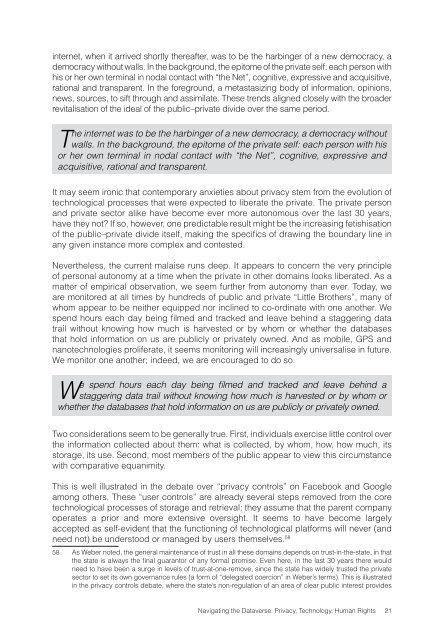Navigating the Dataverse: Privacy, Technology ... - The ICHRP
Navigating the Dataverse: Privacy, Technology ... - The ICHRP
Navigating the Dataverse: Privacy, Technology ... - The ICHRP
You also want an ePaper? Increase the reach of your titles
YUMPU automatically turns print PDFs into web optimized ePapers that Google loves.
internet, when it arrived shortly <strong>the</strong>reafter, was to be <strong>the</strong> harbinger of a new democracy, a<br />
democracy without walls. In <strong>the</strong> background, <strong>the</strong> epitome of <strong>the</strong> private self: each person with<br />
his or her own terminal in nodal contact with “<strong>the</strong> Net”, cognitive, expressive and acquisitive,<br />
rational and transparent. In <strong>the</strong> foreground, a metastasizing body of information, opinions,<br />
news, sources, to sift through and assimilate. <strong>The</strong>se trends aligned closely with <strong>the</strong> broader<br />
revitalisation of <strong>the</strong> ideal of <strong>the</strong> public–private divide over <strong>the</strong> same period.<br />
<strong>The</strong> internet was to be <strong>the</strong> harbinger of a new democracy, a democracy without<br />
walls. In <strong>the</strong> background, <strong>the</strong> epitome of <strong>the</strong> private self: each person with his<br />
or her own terminal in nodal contact with “<strong>the</strong> Net”, cognitive, expressive and<br />
acquisitive, rational and transparent.<br />
It may seem ironic that contemporary anxieties about privacy stem from <strong>the</strong> evolution of<br />
technological processes that were expected to liberate <strong>the</strong> private. <strong>The</strong> private person<br />
and private sector alike have become ever more autonomous over <strong>the</strong> last 30 years,<br />
have <strong>the</strong>y not? If so, however, one predictable result might be <strong>the</strong> increasing fetishisation<br />
of <strong>the</strong> public–private divide itself, making <strong>the</strong> specifics of drawing <strong>the</strong> boundary line in<br />
any given instance more complex and contested.<br />
Never<strong>the</strong>less, <strong>the</strong> current malaise runs deep. It appears to concern <strong>the</strong> very principle<br />
of personal autonomy at a time when <strong>the</strong> private in o<strong>the</strong>r domains looks liberated. As a<br />
matter of empirical observation, we seem fur<strong>the</strong>r from autonomy than ever. Today, we<br />
are monitored at all times by hundreds of public and private “Little Bro<strong>the</strong>rs”, many of<br />
whom appear to be nei<strong>the</strong>r equipped nor inclined to co-ordinate with one ano<strong>the</strong>r. We<br />
spend hours each day being filmed and tracked and leave behind a staggering data<br />
trail without knowing how much is harvested or by whom or whe<strong>the</strong>r <strong>the</strong> databases<br />
that hold information on us are publicly or privately owned. And as mobile, GPS and<br />
nanotechnologies proliferate, it seems monitoring will increasingly universalise in future.<br />
We monitor one ano<strong>the</strong>r; indeed, we are encouraged to do so.<br />
We spend hours each day being filmed and tracked and leave behind a<br />
staggering data trail without knowing how much is harvested or by whom or<br />
whe<strong>the</strong>r <strong>the</strong> databases that hold information on us are publicly or privately owned.<br />
Two considerations seem to be generally true. First, individuals exercise little control over<br />
<strong>the</strong> information collected about <strong>the</strong>m: what is collected, by whom, how, how much, its<br />
storage, its use. Second, most members of <strong>the</strong> public appear to view this circumstance<br />
with comparative equanimity.<br />
This is well illustrated in <strong>the</strong> debate over “privacy controls” on Facebook and Google<br />
among o<strong>the</strong>rs. <strong>The</strong>se “user controls” are already several steps removed from <strong>the</strong> core<br />
technological processes of storage and retrieval; <strong>the</strong>y assume that <strong>the</strong> parent company<br />
operates a prior and more extensive oversight. It seems to have become largely<br />
accepted as self-evident that <strong>the</strong> functioning of technological platforms will never (and<br />
need not) be understood or managed by users <strong>the</strong>mselves. 58<br />
58 As Weber noted, <strong>the</strong> general maintenance of trust in all <strong>the</strong>se domains depends on trust-in-<strong>the</strong>-state, in that<br />
<strong>the</strong> state is always <strong>the</strong> final guarantor of any formal promise. Even here, in <strong>the</strong> last 30 years <strong>the</strong>re would<br />
need to have been a surge in levels of trust-at-one-remove, since <strong>the</strong> state has widely trusted <strong>the</strong> private<br />
sector to set its own governance rules (a form of “delegated coercion” in Weber’s terms). This is illustrated<br />
in <strong>the</strong> privacy controls debate, where <strong>the</strong> state’s non-regulation of an area of clear public interest provides<br />
<strong>Navigating</strong> <strong>the</strong> <strong>Dataverse</strong>: <strong>Privacy</strong>, <strong>Technology</strong>, Human Rights 21
















